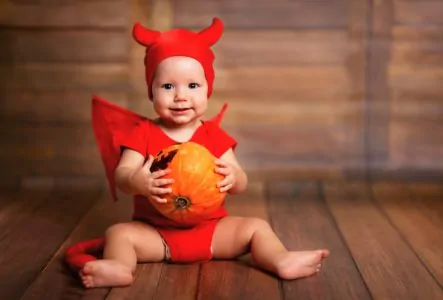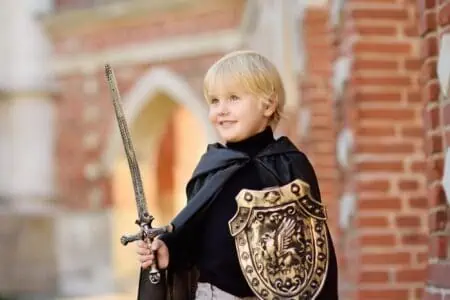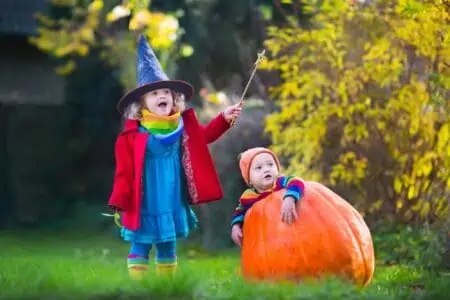Viking names are experiencing a resurgence in popularity these days. From well-known heroes to ancient Norse deities, these colorful, often influential names are many. It can be hard to figure out which one is the best choice for the baby boy or girl you’re expecting.
This extensive list of Viking names will cover all bases, from the old and traditional to the unique and modern. Have a grand Norse time with these fun, vibrant Nordic names for the young adventurers in your life.
100 Powerful Viking Names
Set sail on the Scandinavian seas with these cool Viking names for little warriors in training.
Ailse
Ailse is an Old Norse version of Alice and the Scottish Ailsa. It also means “island of Alfsigr,” a place name in Scotland. Ailse flips the script on a typical girl’s name only to emerge a rare beauty for young girls.
- Origin: Norse
- Meaning: Sweet
- Pronunciation: EYLS
- Variations: Ailsa
- Popularity: In 2014, 78 people were named Ailse worldwide, mostly in Brazil.
Ama
Ama also means “born on Saturday” in African culture and refers to a “wet nurse” in Swedish. It’s a shorter form of Amelia and is a cool way for your young girl to soar like an eagle.
- Origin: Norse
- Meaning: Eagle
- Variations: Amma, Ammah, Amah
- Namesakes: Ama Benyiwa-Doe (born Comfort Saah), the Ghanaian Regional Minister. Ama Agbeze, an England netball gold medalist at the 2018 Commonwealth Games.
- Popularity: Ama is uncommon worldwide, is used most in the Ivory Coast, and ranked 29th in Togo.
Arlan
In Norse culture, Arlan is a variation of Arien. In Gaelic, it means “old” and “pledge.” Arlan won’t feel foreign to your little guy, so try out this old Norse name asap.
- Origin: Norse
- Meaning: Foreigner, stranger
- Pronunciation: AAR-Laen
- Variations: Arlen
- Namesakes: Arlan Hamilton, an American founder of Backstage Capital.
- Popularity: Arlan is uncommon worldwide, used mainly in the Philippines, and ranked 834th in Kazakhstan.
Arvid
Arvid is also popular in Scandinavia, Iran, and Lithuania. It’s based on the Old Norse “ari/ǫrn,” meaning “eagle” and “viðr,” meaning “wood.” Arvid has royal associations, so you can expect to hail little King Arvid very soon.
- Origin: Norse
- Meaning: Forest of eagles
- Pronunciation: AAR-Vahd
- Variations: Arvad, Arvud, Arvyd
- Namesakes: Arvid Posse, the prime minister of Sweden from 1880 to 1883. Arvid Lundberg, a Swedish ice hockey player with Skellefteå AIK of the Swedish Hockey League.
- Popularity: Arvid is uncommon worldwide and used most in Norway, ranked 159th.
Åse
Åse is derived from Aassi, an Old Norse form of the Old English Oswald. It literally means “God.” This divine intervention can be one of the most striking Norse names for the baby you’re expecting.
- Origin: Old Norse
- Meaning: Divine power
- Pronunciation: AHS
- Variations: Asa
- Namesakes: Åse Birkrem, a Norwegian handball player and bronze medalist at the 1986 World Women’s Handball Championship. Åse Hedstrøm, a Norwegian composer and recipient of the Norwegian Society of Composers’ Work of the Year award.
- Popularity: Åse is rare worldwide, used most in Indonesia, and ranked 1,633rd in Papua New Guinea.
Astride
Astride comes from the Old Norse “Ástríðr,” made up of “áns,” meaning “god” and “fríðr,” meaning “beautiful.” It also means “beautiful goddess.” Within Nordic names, Astride carries an almost supernatural amount of beauty.
- Origin: Norse
- Meaning: Divinely beautiful
- Pronunciation: AA-Strahd
- Variations: Astrid, Astryd, Astrad
- Namesakes: Adjoba Astride N’Gouan, a French-Ivorian handballer for the French national team.
- Popularity: Astride is uncommon worldwide and used most in DR Congo, where it’s ranked 116th.
Audun
Audun comes from the Old Norse “Óðinn,” meaning “furious” and “eager.” Odin is the main deity in Norse mythology, appearing as a wise old man with one eye. He’s different from the little boy you’re naming, but Audun sounds more gentle too.
- Origin: Norse
- Meaning: Friend of wealth
- Pronunciation: OW-Duwn
- Variations: Audon, Auden
- Namesakes: Audun Grønvold, a Norwegian skier who won the ski cross World Cup in 2007. Audun Hetland, a Norwegian illustrator who worked for the newspaper Bergens Aftenblad from 1940 to 1942.
- Popularity: In 2014, 4,912 people were named Audun worldwide, mainly in Norway, where it’s ranked 249th.
Axel
Axel may connect to the Hebrew Absalom. It consists of the Old Norse “ans,” meaning “God,” and “ketill,” meaning “helmet.” Axel is somewhat common in Danish and Norwegian culture and can play the peaceful warrior for your little man.
- Origin: Norse
- Meaning: Father of peace
- Pronunciation: AHK-Seyl
- Variations: Axell, Axsel, Axle
- Namesakes: Axel Birnbaum, an Austrian fencer who competed at the 1988 Summer Olympics. Axel Hallberg, a Swedish politician, called the Baby of the House from 2021 to 2022.
- Popularity: Axel ranked 4,881st worldwide, is most popular in Germany, and 68th in Gabon.
Balder
In Norse mythology, Balder is the god of innocence, purity, and beauty. It’s also the name of one of Marvel’s Asgardian heroes. The old world meets new when young Balder makes himself known to all.
- Origin: Norse
- Meaning: Prince
- Pronunciation: BAOL-Dehr
- Variations: Baldr, Baldur, Baldyr
- Namesakes: Balder Tomasberg, an Estonian artist known for paintings of dreamlike or fantastic landscapes.
- Popularity: In 2014, 365 people were named Balder worldwide, mostly in India.
Birger
Birger derives from the Old Norse Birgir, made up of “bjarga,” meaning “save” and “rescue.” One of the most famous Birgers was King Birger, the King of Sweden in the late 13th-century.
- Origin: Norse
- Meaning: To help, to protect
- Pronunciation: BIHR-Gehr
- Variations: Berger
- Namesakes: Birger Malmsten, a Swedish actor known for many Ingmar Bergman films. Birger Sjöberg, a Swedish writer known for the song collection Fridas Bok (Frida’s Book).
- Popularity: Birger is rare worldwide and used most in Norway, where it’s ranked 247th.
Bjorn
Bjorn is the Scandinavian form of Bernard. It can also mean “hero” or “warrior.” Bjorn might be one of the most recognizable Viking names today, and it’s ready for your little bear cub to shine.
- Origin: Norse
- Meaning: Bear
- Pronunciation: Bee-YORN
- Variations: Bjoern, Bjorne
- Namesakes: Bjørn Hansen, a Norwegian journalist for the Norwegian Broadcasting Corporation. Björn Engholm, the German Federal Minister for Education and Science from 1981 to 1982.
- Popularity: Bjorn is uncommon worldwide, used mostly in the Netherlands, and ranked 461st in Belgium.
Bodil
Bodil is a Latin form of the Old Norse Bóthildr, made up of “bót,” meaning “remedy,” and “hildr,” meaning “battle.” Unisex Viking names like Bodil are just as strong as a female or male name.
- Origin: Norse
- Meaning: Commanding
- Pronunciation: BUW-Dihl
- Variations: Bodyl
- Namesakes: Bodil Mårtensson, a Swedish author known for crime novels and young adult adventure books. Bodil Russ, a Norwegian equestrian who competed at the 1956 Summer Olympics in Stockholm.
- Popularity: Bodil is uncommon worldwide and used most in Denmark, ranked 110th.
Brandt
Brandt was a popular German surname, also meaning “fiery torch” in Old Norse. It’s derived from the “brandr,” meaning “torch.” Brandt is an old name that feels modern and new for the young man in your life.
- Origin: Norse, Germanic
- Meaning: Sword
- Pronunciation: BRAHNT
- Variations: Brant
- Namesakes: Brandt Hershman, an American state senator for Indiana from 2000 to 2018. Brandt Louie, a Canadian President and CEO of H.Y. Louie Co. Limited.
- Popularity: In 2014, less than 5,000 people were named Brandt worldwide, mostly in the U.S.
Brenna
Brenna is a diminutive of Brenda and the female form of the male Brendan. It’s also based on the Celtic “braon,” meaning “teardrop.” Brenna is more prevalent in the British Isles but can remain special wherever your feisty girl is.
- Origin: Norse, Celtic
- Meaning: Sword
- Pronunciation: BREHN-ah
- Variations: Brena, Brenah, Brennah
- Namesakes: Brenna O’Brien, a Canadian actress known for voice work in the anime series Inuyasha. Brenna Hassett, an American-British archaeologist who founded TrowelBlazers, championing women archaeologists.
- Popularity: Brenna is uncommon worldwide, used mostly in the U.S., and ranked 1,132nd in Northern Ireland.
Brynhild
Brynhild also means “ready for battle” in German. Brunhilde was a female Valkyrie warrior and the daughter of the Norse god Odin. Whichever of the meanings you subscribe to, Brynhild is one of the more strong Norse names for girls around.
- Origin: Norse
- Meaning: Armored fighting woman
- Pronunciation: BRIHN-Hayld
- Variations: Brunhild, Brynhilda, Brunhilda, Brunhilde
- Namesakes: Brynhild Synstnea, a Norwegian runner finishing 13th at the 1994 European Championships. Brynhild Grasmoen, an American alpine skier who competed at the 1948 Winter Olympics.
- Popularity: Brynhild is extremely rare worldwide, used most in Norway, and ranked 147th in the Faroe Islands.
Chara
Chara originally came from the Latin “cārus,” meaning “darling,” “beloved,” and “loved one.” It’s also the Spanish version of Sarah and the English variation of Charlotte. Chara has multiple meanings but is pretty enough for one lucky little girl.
- Origin: Norse, Latin
- Meaning: Free
- Pronunciation: CHAH-Rah
- Variations: Cara
- Namesakes: Miwa Watabiki (known as Chara), a Japanese singer known for her song “Swallowtail Butterfly (Ai no Uta).” Chara Charalambous, a Cypriot footballer for the Cyprus women’s national team.
- Popularity: Chara is rare worldwide, used most in Greece, and ranked 397th in Cyprus.
Dagmar
Dagmar comes from the Old Norse Dagmær, from “dagr,” meaning “day” and “mær,” meaning “daughter” and “maiden.” Dagmar is often used in various Slavic countries, so it has experience naming well-known little girls worldwide.
- Origin: Scandinavian
- Meaning: Famous day
- Pronunciation: DAAJH-Maar
- Variations: Dagmarr, Dagomar, Dagomarr
- Namesakes: Dagmar Havlová, a Czech actress and wife of Václav Havel, the Czech President. Dagmar Lahlum, a member of the Norwegian resistance during World War II.
- Popularity: Dagmar ranked 3,567th worldwide, is most popular in Germany, and ranked 56th in the Czech Republic.
Dane
In Hebrew, Dane also means “God is my judge.” It was used as a variation of Dean in English but is most known for indicating a man from Denmark. It provides a fantastic way to name a little adventurous boy or girl.
- Origin: Scandinavian
- Meaning: From Denmark
- Pronunciation: DEYN
- Variations: Daen, Daine, Dayn, Dayne
- Namesakes: Dane Zajc, a Slovenian poet and the Slovene Writers’ Association president from 1991 to 1995. Dane Ingham, an Australian footballer who represents the New Zealand national team.
- Popularity: Dane is uncommon worldwide, used mostly in the U.S., and ranked 399th in Croatia.
Ebbe
Ebbe is a diminutive of Eberhard in German, with the root “ebur,” meaning “wild boar.” In Scandinavian, Ebbe is a diminutive of Esben. It means “beautiful family bond” in Danish, which is apt for bonding with the little one you know.
- Origin: Norse
- Meaning: Brave, strong boar
- Pronunciation: EH-Bah
- Variations: Ebbo, Ebba
- Namesakes: Ebbe Schön, a Swedish author and head of the Swedish folklore collection at the Nordic Museum. Ebbe Frick, a Swedish sprint canoer who won three medals at the ICF Canoe Sprint World Championships.
- Popularity: Ebbe is rare worldwide and used most in Denmark, ranked 278th.
Eir
In Norse mythology, Eir is the goddess associated with medicine and healing, plus the concept of mercy. This beautiful meaning is the most peaceful little boys and girls out there.
- Origin: Norse
- Meaning: Protection, help
- Pronunciation: AYR
- Variations: Eira
- Namesakes: Eir Aoi, a Japanese singer who debuted in 2011 with her first single, “Memoria.”
- Popularity: In 2014, 151 people were named Eir worldwide, mainly in Norway, while it’s ranked 511th in the Faroe Islands.
Elsha
Elsha is connected to the Old Norse Ailsa, meaning “island of Alfsigr.” It’s also from the Hebrew name Elisha, meaning “God is salvation.” With an old, rich history, Elsha can help name the precious little girl you care about most.
- Origin: Norse, Germanic
- Meaning: Noble by birth
- Pronunciation: Ehl-SHAH
- Variations: Elisha
- Popularity: In 2014, 1,226 people were named Elsha worldwide, mostly in Indonesia.
Erica
Erica is a Latin spelling taken from the legendary Old Norse Erik. It also means “ever-powerful” in German. Erica is made up of “ei,” from the Norse “alone” and “ríkr,” from “king.”
- Origin: Norse, Germanic
- Meaning: Eternal ruler
- Pronunciation: EHR-ih-Kah
- Variations: Erika
- Namesakes: Erica Blasberg, an American golfer who won the 2004 Laconia Savings Bank Golf Classic. Erica Packer, the second wife of Australia’s eighth richest man, James Packer.
- Popularity: Erica ranked 1,526th worldwide, is most popular in the U.S., and ranked 205th in Brazil.
Erik
Erik is from the Old Norse “ei,” meaning “ever” and “ríkr,” meaning “ruler.” Erik the Red was the most famous Viking warrior in history. Erik is still super popular in the land of Viking names, so your little Erik can grow up big and strong just the same.
- Origin: Norse
- Meaning: Eternal ruler
- Pronunciation: EHR-ihk
- Variations: Eric, Eryk, Erick, Eirik
- Namesakes: Erik “Cachete” Follert, a Chilean basketball player with Chile’s national basketball team at the 2016 South American Basketball Championship. Erik Valdez, an American actor, known for the TV series General Hospital (2012–2013).
- Popularity: Erik ranked 1,294th worldwide, is most popular in the U.S., and ranked 12th in Sweden.
Eskel
Eskel comes from the Old Norse Asketill. The mystical meaning points to a sacrificial vessel used in ancient pagan rituals. Eskel is somewhat antiquated yet proudly shows off this intense meaning for the baby boy you’re expecting.
- Origin: Norse
- Meaning: God’s cauldron
- Pronunciation: EHS-Kehl
- Variations: Eskil, Eskyl
- Popularity: In 2014, 168 people were named Eskel worldwide, mostly in the U.S.
Etoile
Etoile is more known as a French name but originates in Old Norse as Asta, from the Greek name Anastasia. There’s no denying your little girl can be the star of the show as Etoile, which may help her move from being a princess to a queen.
- Origin: Norse, French
- Meaning: Star
- Pronunciation: Iy-TWAOL
- Variations: Etoille
- Popularity: Etoile is very rare worldwide and used most in DR Congo where it’s ranked 2,406th.
Fenrir
Fenrir comes from the Old Norse “fen,” meaning “marsh.” In Norse mythology, Fenrir is a terrifying wolf who kills the god Odin, only to be dispatched by one of Odin’s sons. Your young Fenrir won’t be as scary as the original but lovable.
- Origin: Norse
- Meaning: Fen-dweller
- Pronunciation: FEHN-Rihr
- Popularity: In 2014, 30 people were named Fenrir worldwide, mostly in Russia.
Freja
In Norse mythology, Freja was the goddess of love, beauty, and fertility. She was traditionally blonde and blue-eyed but can find a happy home as the name of your young goddess, no matter where her beauty lies.
- Origin: Norse, Swedish
- Meaning: Lady, a noblewoman
- Pronunciation: FREY-aa
- Variations: Freya, Freyja
- Namesakes: Freja Erichsen, a Danish model known as “Queen of Cool.” Freja Nielsen, a Danish badminton player and silver medalist at the 2018 European Junior Championships.
- Popularity: Freja is very rare worldwide and used most in Denmark, where it’s ranked 564th.
Frida
Frida originated from the Old Norse Fríða, one of the nicknames for female names ending in “fríðr,” meaning “beautiful.” In Hebrew, Frida means “wise judge” or “peaceful ruler.” It’s a strong name for young girls who want to run the world right.
- Origin: Norse
- Meaning: Peace
- Pronunciation: FRIY-Dah
- Variations: Freda, Frieda, Freida
- Namesakes: Frida Hansdotter, a former Swedish World Cup alpine ski racer, and Olympic champion. Frideborg “Frida” Stéenhoff, a Swedish writer who took part in the women’s suffrage movement.
- Popularity: Frida is uncommon worldwide, used most in Tanzania, and ranked 76th in Sweden.
Frigg
In Norse mythology, Frigg was Odin’s wife and the goddess of fertility. You can honor Nordic traditions by naming your little one after the unforgettable Frigg.
- Origin: Scandinavian
- Meaning: To love
- Pronunciation: FRIHG
- Variations: Frig, Fryg, Frygg
- Popularity: In 2014, 50 people were named Frigg worldwide, mostly in Norway.
Frode
Frode is from the Old Norse “fróðr,” meaning “wise.” It can also appear as Frodo, the well-known character in Lord of the Rings. Frode may sound medieval but can celebrate all that is good and true for your little guy in the modern world.
- Origin: Norse
- Meaning: Clever, learned
- Pronunciation: FRUW-Dah
- Variations: Froad, Froade, Frod
- Namesakes: Frode Johnsen, a Norwegian footballer for Odd and Rosenborg in the Tippeligaen league. Frode Gjerstad, a Norwegian jazz musician who’s played in over 50 recordings since 1979.
- Popularity: Frode is uncommon worldwide and used most in Norway, ranked 69th.
Garda
Garda is a form of the Old Norse Gerda and a modern version of Gerd. It’s been everything from the name of an Italian lake to the police force in Ireland. Garda is broad and unisex enough to be the coolest name for the baby you’re expecting.
- Origin: Norse
- Meaning: Shelter
- Pronunciation: GAAR-Dah
- Variations: Gertah, Gerda
- Popularity: In 2014, 1,252 people were named Garda worldwide, mostly in Indonesia, though it’s in the top 10,000 names in Italy.
Gerd
Gerd is a female pet name for the Scandinavian Gerda or Gertrude and a male name in Germanic culture. In Norse mythology, Gerd is a beautiful giant and a unique name you give your boy or girl.
- Origin: Scandinavian
- Meaning: Garden
- Pronunciation: GEHRT
- Variations: Gerda
- Namesakes: Gerd Hegnell, a Swedish actress who received the “Carl Åkermark Scholarship” of the Swedish Academy in 1992. Gerd Kanter, an Estonian discus thrower and gold medalist at the 2008 Summer Olympics.
- Popularity: Gerd ranked 3,268th worldwide, is most popular in Germany and ranked 43rd in Norway.
Gertrude
Gertrude comes from the Germanic “ger,” meaning “spear” and “thrud,” meaning “strength.” Gertrude is famously the name of the Danish queen in Shakespeare’s Hamlet. If too formal, you can call your Gertrude Gertie or Trudy.
- Origin: Scandinavian, Germanic
- Meaning: Strength
- Pronunciation: GEHR-Truwd
- Variations: Gertruyd, Gertrud
- Namesakes: Gertrude Stein, an American novelist best known for hosting a Paris salon, including artists like Pablo Picasso and Ernest Hemingway. Gertrude Mongella, the first Tanzanian president of the Pan-African Parliament.
- Popularity: Gertrude ranked 3,633rd worldwide, is most popular in the U.S., and ranked 32nd in Austria.
Gunhild
Gunhild comes from the Germanic “gunn” and “hild,” both meaning “war.” It’s also associated with “battle” and “fighter.” This powerful girl’s name can set the stage for awesomeness outside Sweden.
- Origin: Scandinavian, Germanic
- Meaning: Shield-maiden
- Pronunciation: GAHN-Hihl
- Variations: Gundhild, Gunnhild, Gunhilde
- Namesakes: Gunhild Rosén, a Swedish ballet master of the Royal Swedish Ballet in Stockholm. Gunhild Kyle, Sweden’s first professor of women’s history at the University of Gothenburg.
- Popularity: Gunhild is very uncommon worldwide, used most in Sweden, and ranked 225th in Norway.
Gunnar
Gunnar is associated with a Viking quote meaning “brave and bold warrior.” It’s made up of “gunnr,” meaning “war” and “arr,” meaning “warrior.” It’s still used in Scandinavia but might need a push to excel at being the best name for your little boy.
- Origin: Norse
- Meaning: Fighter
- Pronunciation: GAHN-aar
- Variations: Gunner, Gunar
- Namesakes: Gunnar Garfors, a Norwegian poet awarded the Norwegian King’s Service Medal in Silver. Gunnar Uusi, an Estonian chess player who won the Estonian Chess Championship six times.
- Popularity: Gunnar is uncommon worldwide, used most in Norway, and ranked 6th in Iceland.
Halfdan
Halfdan was a leader of the Great Heathen Army that invaded East Anglia in England in 865 CE. It was used to denote a “half-Dane,” but has a personality all on its own for the young Viking in your life.
- Origin: Norse
- Meaning: Half-Dane
- Pronunciation: HAALF-Daen
- Variations: Halfdane, Halvdan
- Namesakes: Halfdan Rasmussen, a Danish poet, awarded the Ministry of Culture’s children’s book prize in 1965. Halfdan Nielsen, a Danish film composer who won two Danish Grammy Awards.
- Popularity: In 2014, 62 people were named Halfdan worldwide, mostly in Norway, while it ranked 908th in Greenland.
Halley
Halley is also an English surname from the Old English “heall,” meaning “large house” and “leah,” meaning “woodland clearing.” It’s a derivative of the female Hallie and the female version of Henry.
- Origin: Norse, English
- Meaning: Commander
- Pronunciation: HHAEL-iy
- Variations: Hallie
- Namesakes: Halley Gross, an American screenwriter known for episodes of the HBO series Westworld. Halley Hough, the first curator of the Henry Art Gallery, University of Washington.
- Popularity: Halley is rare worldwide and used most in the U.S.
Halvar
Halvar is derived from the Old Norse “hallr,” meaning “stone” and “vǫrðr,” meaning “guard.” This very important job can belong to the young man you love most with this rarest of Viking names.
- Origin: Norse
- Meaning: Guardian of the rock
- Pronunciation: HHAEL-Vaar
- Variations: Halvard, Halvor
- Namesakes: Erik Halvar Björk, a Swedish actor who worked at the Malmö City Theater from 1962 to 1986.
- Popularity: In 2014, 325 people were named Halvar worldwide, and used most in Norway, where it’s ranked 1,359th.
Harold
Harold has Germanic origins from “harja-waldaz,” meaning “military power.” It’s based on the Norse Heraldr and is a derivative of Hereweald. Harold is truly the simplest way to utilize these old-world names for the modern boy’s life.
- Origin: Norse, Germanic
- Meaning: Army ruler
- Pronunciation: HHAA-Rowld
- Variations: Harald
- Namesakes: Harold Macmillan, the Prime Minister of the UK from 1957 to 1963. Harold Pinter, a British playwright, and Nobel Prize winner.
- Popularity: Harold ranked 1,327th worldwide, is most popular in the U.S., and ranked 54th in Jamaica.
Hedda
Hedda is a diminutive of the German Hedwig and originally meant “refuge in war.” It’s based on “hadu,” meaning “combat,” and “wīg,” meaning “war.” Hedda has power and yet remains a vintage-style, feminine name for tough girls.
- Origin: Norse, Germanic
- Meaning: Battle maiden
- Pronunciation: HHT-aa
- Variations: Heda, Hetta
- Namesakes: Hedda Hynne, a Norwegian runner who competed at the 2016 IAAF World Indoor Championships. Hedvig “Hedda” Hjortsberg, a Swedish ballerina for the Royal Swedish Ballet.
- Popularity: Hedda is rare worldwide, used mostly in Germany, and ranked 787th in Norway.
Heimdall
In Norse mythology, Heimdallr is the watchman of the gods and guards Bifrost, the rainbow bridge. The name also means “god of dawn and light” and is packed with powerful meaning for your young deity.
- Origin: Norse
- Meaning: White god
- Pronunciation: HHIHM-dl
- Variations: Heimdal
- Popularity: In 2014, 36 people were named Heimdall worldwide, mostly in Germany.
Hela
In Norse mythology, Hera is the goddess of the underworld realm who presides over the deceased. This intense, epic meaning has strength yet still sounds super feminine for the young goddess-in-training you love.
- Origin: Norse
- Meaning: Goddess of the underworld
- Pronunciation: HHEHL-aa
- Variations: Helen
- Namesakes: Hela Gruel, a German actress known for the film The Buddenbrooks (1959). Hela Ouardi, a Tunisian writer, specializing in Islam and French literature.
- Popularity: Hela is rare worldwide, used mostly in India, and ranked 143rd in Tunisia.
Helga
Helga is the female form of the Old Norse Helgi, from “heilagr,” meaning “the sacred one.” It can also mean “divine woman.” Helga is a classic Scandinavian name still very popular there, including in Germany and wherever your little lady resides.
- Origin: Old Norse
- Meaning: Blessed, holy
- Pronunciation: HHEHL-Gaa
- Variations: Helge
- Namesakes: Helga Gnauer, an Austrian fencer who competed at the 1960 Summer Olympics. Helga Haugen, a Norwegian politician, elected to the Norwegian Parliament in 1985.
- Popularity: Helga ranked 963rd worldwide and is most popular in Germany, where it’s ranked 20th.
Herja
Herja is one of the gods known as Valkyries, in Norse and Germanic mythology. She is known as “she who devastates.” Herja is an ancient, rarely given name for the young girl who wants to do great things in the world.
- Origin: Norse
- Meaning: Devastate
- Pronunciation: HER-yaah
- Variations: Harja
- Popularity: In 2014, 35 people were named Herja worldwide, mostly in Indonesia.
Hod
In Norse mythology, Hod was a blind god associated with night and darkness and the son of the principal god, Odin. It’s also a nickname for Horace. Hod offers a mysterious meaning and sounds like the coolest name for any lucky little boy.
- Origin: Norse
- Meaning: God of darkness
- Pronunciation: HHAAD
- Namesakes: Hod Lipson, an American robotics engineer, featured in the 2018 documentary Do You Trust This Computer? Horace “Hod” Kibbie, an American baseball player for the Boston Braves in Major League Baseball.
- Popularity: Hod is very rare worldwide, used most in Egypt, and ranked 1,443rd in Israel.
Inge
In Norse mythology, Ing was known as the god of peace and fertility. It’s one of many Germanic names beginning with “Ing,” like Ingram, Ingrid, and Inger.
- Origin: Norse, Germanic
- Meaning: Ing’s protection
- Pronunciation: IHNG-Gah
- Variations: Ing
- Namesakes: Inge Krokann, a Norwegian writer most known for the book I Dovre Sno (1929). Inge Faes, a member of the Belgian Senate in 2010.
- Popularity: Inge ranked 1,772nd worldwide, is most popular in Germany and ranked 49th in Denmark.
Kari
Kari is a Norwegian diminutive of Katherine. It’s also the name of the Scandinavian god of wind. It’s usually given to girls in Norway and boys in Iceland. Kari may be the cutest name for the young one in your life.
- Origin: Norse
- Meaning: Pure
- Pronunciation: KAA-Riy
- Variations: Karin, Kerry
- Namesakes: Kari Johansen, a two-time Norwegian Olympic handball champion. Kari Ketonen, a Finnish actor, known for the sketch comedy TV show Putous.
- Popularity: Kari ranked 3,066th worldwide, is most popular in India, and ranked 4th in Finland.
Kirk
Kirk comes from the Old Norse “kirkja,” a place name for a person who lives near a church. The name also made its way to England and Scotland eventually. Kirk is very recognizable as a boy’s name and can be an instant classic yet again.
- Origin: Scandinavian, Scottish
- Meaning: Church
- Pronunciation: KERK
- Variations: Kerk, Kirc, Kurk
- Namesakes: Kirk O’Bee, an American road racing cyclist who won the USPRO pursuit championship in 1997.
- Popularity: Kirk is uncommon worldwide, used mainly in the U.S., and ranked 392nd in Jamaica.
Knud
Knud comes from the Old Norse “knútr,” meaning “knot.” It also means “free” and “noble” from the German “chnot.” It may be related to the 11th-century Danish prince Knut and can properly name the little royal you love most.
- Origin: Norse
- Meaning: Norse, Germanic
- Pronunciation: NUWD
- Variations: Knut
- Namesakes: Knud Rasmussen, a Greenlandic–Danish polar explorer and the first European to cross the Northwest Passage via dog sled. Knud Heinesen, the Danish Minister of Education in 1975.
- Popularity: Knud is very uncommon worldwide, used most in Denmark, and ranked 13th in Denmark.
Lagertha
Lagertha was a famous Viking shieldmaiden and the first wife of Ragnar Lothbrok, a 9th-century Viking king. Lagertha might represent the most powerful Nordic names for little girls who want to show their strength.
- Origin: Norse
- Meaning: Shield maiden
- Pronunciation: LAH-gerth-Ah
- Variations: Lathgertha, Ladgerda
- Popularity: In 2014, 11 people were named Lagertha worldwide, mostly in the U.S.
Lange
Lange originally appeared as Lang in Old Norse. In German, “lang” means “long.” As a nickname for a tall person, Lange is a classic Nordic name, no matter your little boy’s height.
- Origin: Norse
- Meaning: Tall one
- Pronunciation: LAHNG
- Variations: Lang
- Namesakes: Stuart Langelaan (known as Lange), a British record producer known for mixes made with the Pet Shop Boys.
- Popularity: Lange is extremely rare worldwide, used mostly in the U.S., and ranked 2,331st in Congo.
Leif
Leif is derived from the Old Norse Leifr, meaning “descendant.” It’s most known as the name of the Norse explorer Leif Erickson. It’s also from the Old Norse “Iiufr,” meaning “the beloved.”
- Origin: Norse
- Meaning: Heir
- Pronunciation: LEYF
- Variations: Lief, Leef, Leife
- Namesakes: Leif Garrett (born Leif Per Nervik), an American 1970s teen idol. Leif Davis, an English footballer who plays for Leeds United.
- Popularity: Leif is uncommon worldwide and used most in Sweden, where it’s ranked 22nd.
Lemond
Lemond is a variation of the Old Norse Lamont, from Logmadr. It was also a Scottish surname taken from the Gaelic name MacErcharwhich. Lemond has come a long way to be the distinctive name for the little man of the law you’re raising.
- Origin: Norse, Scottish
- Meaning: Law-man
- Pronunciation: Leh-MAHND
- Variations: Lammond
- Popularity: In 2014, 646 people were named Lemond worldwide, mostly in Haiti.
Liv
Liv comes from the Old Norse “hlíf,” meaning “shelter” and “protection.” Liv became popular again because of American actress Liv Tyler. Liv is a short and sweet way for a little girl to be proud of this traditional Scandinavian name.
- Origin: Scandinavian
- Meaning: Life
- Pronunciation: LIHV
- Variations: Live, Lyv
- Namesakes: Liv Ullmann, a Norwegian actress, and muse of filmmaker Ingmar Bergman. Liv Tomter, a Norwegian politician, elected to the Norwegian Parliament in 1950.
- Popularity: Liv is uncommon worldwide and used most in Norway, where it’s ranked 16th.
Loki
In Norse mythology, Loki is the god of mischief. He was a famous trickster, and even appears as a character in Marvel Comics. Loki might be the trendiest way to name the naughty little boy or girl you know.
- Origin: Norse
- Meaning: Airy
- Pronunciation: LOW-Kiy
- Variations: Lokee, Lokey, Lokie
- Namesakes: Hannelore “Loki” Schmidt, the wife of Helmut Schmidt, the Chancellor of Germany from 1974 to 1982. Darren McGarvey (known as Loki), a Scottish rapper and activist during the Scottish independence referendum in 2014.
- Popularity: Loki is rare worldwide, used most in India, and ranked 2,916th in Nepal.
Lumi
Lumi was an Old Norse word meaning “light-bringer.” It also means “snow” in Estonian and is the Albanian word for “river.” It isn’t around much these days, so take this cute girl’s name for the little snowflake you want to name.
- Origin: Finnish
- Meaning: Snow
- Pronunciation: LOO-Mee
- Namesakes: Lumi Cavazos, a Mexican actress known for the film Like Water for Chocolate. Lumi Pollack, an American actress, known for the film The Fallout (2021).
- Popularity: Lumi is rare worldwide, used most in Nigeria, and ranked 1,421st in Finland.
Lyall
Lyall comes from the Old Norse name Liulfr,” from “ulfr,” meaning “wolf.” It was a much-used Scottish surname yet never became very common as a given name globally.
- Origin: Norse, Scottish
- Meaning: Wolf
- Pronunciation: LIE-ael
- Variations: Lyle, Lyal, Lyel, Lyell
- Namesakes: Lyall Hall, an Australian member in the Legislative Assembly from 1897 until 1901. Lyall Smith, an American sports writer and President of the Baseball Writers’ Association of America from 1955 to 1956.
- Popularity: Lyall is very rare worldwide, used mostly in Canada, and ranked 763rd in New Zealand.
Magnus
Magnus is Scandinavian, taken from Charlemagne’s Latin name, “Carolus Magnus,” the famous Frankish ruler. It became the Old Norse “magn-hús,” meaning “powerhouse.”
- Origin: Scandinavian
- Meaning: Great
- Pronunciation: MAEG-Nahs
- Variations: Magnes, Magnuss
- Namesakes: Magnus Norman, a Swedish tennis player who reached the French Open finals in 2000. Magnus Cormack, an Australian politician and President of the Senate from 1971 to 1974.
- Popularity: Magnus is uncommon worldwide and used most in Sweden, ranked 161st.
Nanna
In Norse mythology, Nanna is the goddess associated with joy, peace, and the moon. Nanna often means “grandmother” and “mother” in Swedish, but it can work wonders for the baby girl you’re expecting.
- Origin: Norse
- Meaning: Daring
- Variations: Nanne, Nana
- Namesakes: Nanna Egedius, a Norwegian figure skater who competed at the 1936 Winter Olympics. Nanna Hilmarsdóttir, an Icelandic musician with the indie folk band Of Monsters and Men.
- Popularity: Nanna is uncommon worldwide and used most in Denmark, ranked 161st.
Niel
Niel is derived from the Gaelic “nél,” meaning “cloud” and “niadh,” also meaning “champion.” It was adopted by Vikings who visited Ireland and became a well-known Scandinavian name that can be the best for your little guy.
- Origin: Irish
- Meaning: Champion
- Pronunciation: NIY-el
- Variations: Neil, Neill, Nile
- Popularity: Niel is uncommon worldwide and used most in the Philippines, ranked 1,313rd.
Njord
In Norse mythology, Njord is the god of winds, navigation, and prosperity. It can also mean “north.” This powerful leader’s name from the old world can charm the little boy you’re expecting.
- Origin: Norse
- Meaning: Strong, vigorous
- Pronunciation: Niy-RD
- Variations: Njorde
- Popularity: In 2014, 45 people were named Njord worldwide, mostly in Norway, while it’s ranked 2,415th in Latvia.
Odin
Odin comes from the Old Norse “óðr,” meaning “inspired” and “fury.” In Norse mythology, Odin is the highest of the Scandinavian gods and is the ruler of Valhalla, the paradise.
- Origin: Norse
- Meaning: Lord of frenzy
- Pronunciation: OW-Dihn
- Variations: Oddin, Oden, Odyn
- Namesakes: Odin Langen, an American politician serving six terms in the U.S. House of Representatives from 1959 to 1971.
- Popularity: Odin is rare worldwide, used most in Indonesia, and ranked 1,074th in Norway.
Olav
Olav comes from the Old Norse “anu,” meaning “ancestor” and “leifr,” meaning “descendant” or “heir.” Olav and Olaf were quite popular names for Swedes and Swedish-American immigrants but can name any little boy in your family line.
- Origin: Norse
- Meaning: Relic, ancestral heritage
- Pronunciation: Ow-LAAV
- Variations: Olaf
- Namesakes: Olav V (born Prince Alexander of Denmark), the King of Norway from 1957 until his death in 1991. Olaf Lubaszenko, a Polish actor known for Krzysztof Kieślowski films.
- Popularity: Olav is very uncommon worldwide and used most in Norway, where it’s ranked 49th.
Olen
Olen is a diminutive of Olaf and also means “to inherit” in Swedish. This fully Scandinavian name is a thoughtful way to keep the Scandinavian tradition going strong.
- Origin: Norse
- Meaning: Relic
- Pronunciation: OW-Lehn
- Variations: Olin
- Namesakes: Olen, an ancient Greek poet known for his “ancient hymns.” Olen Steinhauer, an American writer of spy fiction novels like The Tourist.
- Popularity: Olen is rare worldwide, used mostly in the U.S., and ranked 2,160th in Ukraine.
Osborn
Osborn began as a surname taken from the Old Norse “Asbjorn,” made up of “às,” meaning “god” and “bjorn,” meaning “bear.” This quirky Norse name for boys can deliver for the lovable little guy in your life.
- Origin: Norse
- Meaning: Bear god
- Pronunciation: AAZ-Baorn
- Variations: Osborne, Osbourn, Osbourne, Ozborne
- Popularity: Osborn is rare worldwide and used most in Ghana, ranked 1,297th.
Ragnar
Ragnar is derived from the Old Norse elements “ragin,” meaning “counsel” and “hari,” meaning “army.” Ragnar Lodbrok was a storied Viking hero known in Scandinavian lore who can be honored by the sweet yet strong boy you know.
- Origin: Norse, Germanic
- Meaning: Army rule
- Pronunciation: RAAH-Naar or RAHNG-nahr
- Variations: Ragner
- Namesakes: Ragnar Klavan, an Estonian footballer with the Estonia national team. Ragnar Skancke, the Norwegian Minister for Church and Educational Affairs during World War II.
- Popularity: Ragnar is rare worldwide, used most in Norway, and ranked 33rd in Iceland.
Ralf
Ralf is known as the Old English Rædwulf, but originated as the Old Norse Raðulfr, made up of “rað,” meaning “counsel” and “ulfr,” meaning “wolf.” Ralf is a less common but unique spelling of Ralph, so up your young boy’s game as Ralf.
- Origin: Norse
- Meaning: Wolf counsel
- Pronunciation: RAELF
- Variations: Ralfe, Ralph
- Namesakes: Ralf Richter, a German actor known for the Academy Award-nominated 1981 film Das Boot. Ralf Teles, a Brazilian footballer for Corinthians.
- Popularity: Ralf ranked 2,675th worldwide and is most popular in Germany, where it’s ranked 72nd.
Randi
Randi may not sound Nordic, but is a female nickname for Ragnfrid, from the Old Norse Ragnfríðr. It’s unisex but is used more as a girl’s name in Scandinavia and a boy’s name elsewhere.
- Origin: Norse
- Meaning: God-lovable
- Pronunciation: RAEN-Diy
- Variations: Randy, Randie, Randey
- Namesakes: Randi Gaustad, a Norwegian curator at the Norwegian Museum of Decorative Arts and Design since 1983. Randi Bratteli, the wife of Trygve Bratteli, Prime Minister of Norway from 1971 to 1972 and 1973 to 1976.
- Popularity: Randi is uncommon worldwide, used mostly in the U.S., and ranked 29th in Norway.
Rayner
Rayner is a version of the Scandinavian name Ragnar. It uses the Germanic elements “ragin,” meaning “counsel” and “hari,” meaning “army.” Rayner is just as strong as the most powerful Norse warrior, so likely as perfect for your little guy.
- Origin: Norse, Germanic
- Meaning: Strong counselor
- Variations: Reynir, Reyner, Rainer
- Popularity: Rayner is rare worldwide and used most in Malaysia, ranked 2,015th.
Revna
Revna was a woman living in the Viking settlement of Ravensthorpe in 9th-century England. She was a warrior of the “Raven clan” and is the poster woman for awesome little girls named Revna who want to fly wherever their heart takes them.
- Origin: Norse
- Meaning: Raven
- Variations: Hrefna
- Popularity: In 2014, 33 people were named Revna worldwide, mostly in Indonesia.
Rikki
Rikki is an alternate version of the Old Norse Erica and even Frederick since Rikki is unisex. It also means “forever” and “alone.” Rikki works as a cute name for boys or girls who want an easy-to-digest slice of Nordic culture in a name.
- Origin: Norse
- Meaning: Complete ruler, peaceful
- Variations: Ricki, Ricky
- Namesakes: Richard Allan Ream (known as Rikki Rockett), an American drummer for the rock band Poison. Rikki Fleming, a Scottish footballer for Ayr United in the Scottish Football League.
- Popularity: Rikki is very uncommon worldwide, mostly used in the U.S., and ranked 1,710th in Australia.
Roald
Roald came from the Old Norse Hróðvaldr, made up of “hróðr,” meaning “fame” and “valdr,” meaning “leader.” The most famous Roald is Roald Dahl, who wrote Charlie and the Chocolate Factory and can inspire kids globally.
- Origin: Norse
- Meaning: Famous ruler
- Pronunciation: ROW-aal
- Variations: Roal, Rold
- Namesakes: Roald Amundsen, a Norwegian explorer of polar regions. Roald Als, a Danish cartoonist who worked with the Danish newspaper Weekendavisen.
- Popularity: Roald is rare worldwide and most used in Norway, where it’s ranked 242nd.
Roar
Roar came from the Old Norse Hróðgeirr. It’s another version of the Norman-French Roger. Roar is made up of “hrōþiz,” meaning “fame” and “gaizaz,” meaning “javelin.”
- Origin: Norse
- Meaning: Fighter of praise
- Pronunciation: RUW-aar
- Namesakes: Roar Flåthen, a Norwegian politician and leader of the Norwegian Confederation of Trade Unions 2007 to 2013. Roar Bakke, a Norwegian ice hockey player with the Norwegian national ice hockey team at the Winter Olympics in 1952.
- Popularity: Roar is rare worldwide and mostly used in Norway where it’s ranked 136th.
Rolo
Rolo came from the Old Norse name Hrolfr and the Germanic “hrod,” meaning “fame” and “wulf,” meaning “wolf.” Rolo is super rare, so your cute Nordic wolf cub might be the only Rolo in town.
- Origin: Norse
- Meaning: Wolf
- Variations: Rollo
- Namesakes: Rolando Dominguez (known as Rolo Puente), an Argentine comedian and actor. Rolo Villar, an Argentine radio host and winner of the 2014 Martín Fierro Awards for best work in humor.
- Popularity: In 2014, 1,379 people were named Rolo worldwide, mostly in the Ivory Coast.
Rune
Rune comes from the Old Norse Rúni and indicates a magical Nordic letter used for divining purposes. It also refers to “secret lore” that the Rune alphabet has to tell, which your little one can have a solid connection to.
- Origin: Norse
- Meaning: Secret
- Pronunciation: RUWN
- Namesakes: Rune Waldekranz, a Swedish film producer and winner of the Special Achievement award at the Guldbagge Awards in 1969. Rune Eriksen, a Norwegian musician, known for the black metal band Mayhem.
- Popularity: Rune is uncommon worldwide and mainly used in Norway, where it’s ranked 22nd.
Selby
Selby is known as a surname that denotes a town in Yorkshire, England. It’s derived from the Old Norse “selja,” meaning ‘”willow” and “býr,” meaning “farm.” Selby made its way from Viking culture to Northern England and to your young man.
- Origin: Norse, English
- Meaning: Willow settlement
- Pronunciation: SEHL-Biy
- Variations: Shelby
- Namesakes: Selby Munsie, an Australian member of the Legislative Assembly of Western Australia. Selby Baqwa, South Africa’s Public Protector from 1995 to 2002.
- Popularity: Selby is rare worldwide, mostly used in South Africa, and ranked 112th in Swaziland.
Siegrun
In Norse mythology, Siegrun (spelled Sigrun) marries Helgi and dies of sadness after he’s slain by her brother Dagr. This emotional story bears a history of great tradition for Nordic names as vibrant as Siegrun.
- Origin: Old Norse
- Meaning: Victory rune
- Pronunciation: SIY-Grahn
- Variations: Sigrun
- Namesakes: Siegrun Klemmer, a German politician and member of the German Bundestag from 1990 to 2002.
- Popularity: In 2014, 3,315 people were named Siegrun worldwide, mostly in Germany, while it’s ranked 1,123rd in Austria.
Sigrid
Sigrid comes from the Old Norse Sigríðr, consisting of “sigr,” meaning “victory” and “fríðr,” meaning “beautiful.” You can call your Sigrid Sig or Sigi as a cute nickname.
- Origin: Norse
- Meaning: Victory, beautiful
- Pronunciation: SIY-Griyd
- Variations: Sigryd, Sigryde
- Namesakes: Sigrid Agren, a French model famous during the Elite Model Look in 2006. Sigrid Undset, a Norwegian-Danish novelist, awarded the Nobel Prize for Literature in 1928.
- Popularity: Sigrid ranked 3,861st worldwide and is most popular in Germany, where it’s ranked 132nd.
Skeet
Skeet is known as a surname used in Northern England, but derives from the Old Norse “skjote,” meaning “swift.” It can also mean “son of Sket.” Skeet is hardly used nowadays, but you can bring back this family name for the swiftest boy you know.
- Origin: Norse, English
- Meaning: Swift
- Pronunciation: SKIYT
- Variations: Skeat, Skeate
- Namesakes: Skeet Reese, an American sport fisherman, and the 2007 B.A.S.S. Toyota Tundra Angler of the Year. Skeet Ulrich (born Bryan Trout), an American actor known for the Scream film franchise.
- Popularity: Skeet is extremely rare worldwide and used most in the U.S.
Solveig
Solveig also means “the strong house” in Old Norse. It’s derived from the Old Norse “salr,” meaning “house” and “vig,” meaning “reign,” along with the Norwegian “sol,” meaning “sun.”
- Origin: Norse
- Meaning: Daughter of the sun
- Pronunciation: SAAL-Veyihg
- Variations: Solvejg, Solvig, Solvige
- Namesakes: Solveig Dommartin, a French actress known for the Wim Wenders film Wings of Desire (1987). Solveig Torsvik, a Norwegian politician, elected to the Norwegian Parliament in 1993.
- Popularity: Solveig is uncommon worldwide and mainly used in Norway, where it’s ranked 35th.
Sten
Sten is Germanic and Dutch primarily but comes from the Old Norse name Stæinn, meaning “rock” or “cliff.” Its equivalent is Peter, which means “rock” or “stone.” This Scandinavian classic is tops in Sweden and can be likewise for your guy.
- Origin: Norse
- Meaning: Stone
- Pronunciation: STAYN
- Variations: Steen, Stein, Steyn
- Namesakes: Sten Grytebust, a Norwegian footballer for Aalesund. Sten Lassmann, an Estonian pianist known for playing Heino Eller’s music.
- Popularity: Sten is uncommon worldwide and mostly used in Sweden, where it’s ranked 75th.
Stian
Stian is a version of the Old Norse Stígandr, meaning “wanderer.” Stian can also mean “swift on his feet” and is related to the Scandinavian Stig. Stian is a “voyager” or “pilgrim” who can find his way into your little guy’s life.
- Origin: Norse
- Meaning: Wanderer
- Pronunciation: STIY-aen
- Variations: Stieran, Stieryn
- Namesakes: Stian Eckhoff, a Norwegian biathlete with two World Cup victories from 2004 to 2005. Stian Thoresen (known as Shagrath), a Norwegian musician and founding member of the band Dimmu Borgir.
- Popularity: Stian is very uncommon worldwide and mostly used in Norway, where it’s ranked 76th.
Storm
Storm came from the Old Norse “stormr,” but was better known as the English surname Storm, presented as Storms and Stormes, meaning “son of Storm.” This blustery name is half-Nordic, half-nature for the wild little one in your life.
- Origin: Norse, English
- Meaning: To storm
- Variations: Storme, Stormm
- Namesakes: Storm Sanders, an Australian tennis player who competed at the 2020 Summer Olympics. Storm Bull, a Norwegian-American mayor of Madison, Wisconsin from 1901 to 1902.
- Popularity: Storm is very rare worldwide, primarily used in the U.S., and ranked 2,788th in New Zealand.
Svana
Svana is the female version of the Scandinavian Svanr and a short form of names containing “svan.” Svana has a Slavic sound but is all Norse when naming a swan-like creature or little girl.
- Origin: Norse
- Meaning: Like a swan
- Pronunciation: SVAEN-ah
- Popularity: In 2014, 2,450 people were named Svana worldwide, mostly in India, while it ranks 463rd in Iceland.
Sven
Sven also means “young warrior” and is possibly one of the most recognizable Nordic names for boys around. It was a medieval Swedish name originating from “sven av vapen,” meaning “sven of arms,” referring to a squire.
- Origin: Norse
- Meaning: Young man
- Pronunciation: SVEHN
- Variations: Svein, Sveinn, Svenn, Sveyn
- Namesakes: Sven Alkalaj, the Permanent Representative of Bosnia and Herzegovina to the UN. Sven Nykvist, a Swedish cinematographer known for working with director Ingmar Bergman.
- Popularity: Sven ranked 3,613rd worldwide, is most popular in Germany, and ranked 11th in Sweden.
Thorin
Thorin arose from Thor, the god of thunder in Norse mythology. It also means “thunder” and can shake the ground with its Norse strength.
- Origin: Norse
- Meaning: Brave, daring one
- Pronunciation: THAOR-ihn
- Variations: Torin
- Popularity: In 2014, 297 people were named Thorin worldwide, mostly in the U.S.
Thorsson
Thorsson is one of many Viking names emanating from the Norse god of thunder, Thor. Thorsson is rarely used but also means “son of Thor” so its connection to the Norse gods is strong.
- Origin: Norse
- Meaning: Thunder
- Pronunciation: THAOER-Sehn
- Variations: Thorson, Thorsen
- Popularity: In 2014, one person was named Thorsson worldwide in Afghanistan.
Tora
Tora is the female version of Thor, named after the Norse god of thunder. It can also mean “goddess” in Old Norse and is the ideal choice for the Viking goddess you’re expecting.
- Origin: Norse
- Meaning: Thunder
- Variations: Thora, Torah, Torra
- Namesakes: Tora Aasland, a member of the Norwegian Parliament from 1985 to 1993. Tora Teje, a Swedish silent film actress, appearing in films between 1920 and 1939.
- Popularity: Tora is very uncommon worldwide, mostly used in Ethiopia, and ranked 481st in Norway.
Torrey
Torrey comes from the Gaelic “torran,” meaning “mound,” but originates from the Nordic name Torry, meaning “Thor’s ruler.” Torrey is the cutest of names that goes back to the Norse god of thunder, Thor.
- Origin: Norse, Gaelic
- Meaning: Winner, conqueror
- Pronunciation: TAOR-iy
- Variations: Tori, Torri, Torrie
- Namesakes: Torrey Westrom, the first blind person elected to the Minnesota Legislature. Torrey Mitchell, a Canadian ice hockey player with the Montreal Canadiens of the National Hockey League.
- Popularity: Torrey is rare worldwide, mostly used in the U.S., and ranked 1,525th in Bermuda.
Tove
Tove is one of three names, in addition to Thor and Tuva, which come from Old Norse letters that don’t exist anymore yet are still in use today. It can also mean “good” in Hebrew. Tove originated from the Norse Tyr, the god of the sky, justice, and war.
- Origin: Norse
- Meaning: Beautiful
- Pronunciation: TUW-Vah
- Variations: Tova
- Namesakes: Tove Jansson, a Swedish-Finnish author known for the Moomin books for children, starting in 1945. Tove Fergo, a member of the Danish parliament (Folketinget) from 1994 to 2005.
- Popularity: Tove is uncommon worldwide and primarily used in Norway, where it’s ranked 53rd.
Tyr
In Norse mythology, Tyr is the god of law, war, and victory. It comes from “tivar,” which means “gods,” staking its claim among strong Norse names for boys.
- Origin: Norse
- Meaning: God of war
- Pronunciation: TIHIYR
- Variations: Ty
- Popularity: In 2014, 156 people were named Tyr worldwide, mostly in the U.S.
Ulli
Ulli means “gem of the sea” and “sacred red” in Old Norse. It’s also a German boy’s name meaning “rich,” “powerful,” and “heritage.” Ulli means “mistress of all” as a German girl’s name, so she is ready to take on all the strong boys and girls there are.
- Origin: Norse
- Meaning: Wealthy
- Pronunciation: AHL-Liy
- Variations: Uli
- Namesakes: Ulli Lommel, a German actor known for his work with the New German Cinema movement.
- Popularity: Ulli is rare worldwide, mostly used in Germany, and ranked 964th in Austria.
Ulrik
Ulrik often uses Ulli or Uli as a nickname. It was once the German-surname Uodalrich, made up of “uodal,” meaning “noble heritage,” and “rich,” meaning “powerful.” Ulrik can also appear as Ulrich when used as a modern Danish surname.
- Origin: Norse
- Meaning: Rich and noble heritage
- Pronunciation: AHL-Rihk
- Variations: Ulrich, Ulric, Ullric
- Namesakes: Ulrik Lindkvist, a Danish footballer for FC Midtjylland. Ulrik Motzfeldt, a Norwegian politician in the Norwegian Parliament.
- Popularity: Ulrik is rare worldwide, mostly used in Denmark, and ranked 130th in Greenland.
Vali
In Norse mythology, Vali is the son of the god Odin and the giantess Rindr. He is the god of vengeance, but don’t let that scare you off. Vali sounds much cuter than his predecessor did.
- Origin: Norse
- Meaning: Son of Odin
- Pronunciation: VAA-Liy
- Variations: Valie, Vailey, Vaili, Valli
- Namesakes: Vali Gasimov, an Azerbaijani footballer for FC Mayak Kharkov. Vali Nasr, an Iranian-American academic specializing in the Middle East and the Islamic world.
- Popularity: Vali is uncommon worldwide, mostly used in India, and ranked 318th in Azerbaijan.
Vidar
Vidar was Odin’s strong yet mute son in Norse mythology. Vidar can also mean “wide ruler” in Old Norse, but this contradiction of strength and serenity can make the perfect combination for your little boy.
- Origin: Norse
- Meaning: Quiet god
- Pronunciation: VIY-Daar
- Namesakes: Vidar Kjartansson, an Icelandic footballer for Norwegian club Vålerenga IF. Vidar Kleppe, the Norwegian leader of the Democratic party from 2002 to 2012.
- Popularity: Vidar is uncommon worldwide, mainly used in Norway, where it’s ranked 96th.
Viggo
Viggo might have come from the Old Norse Vigge or from Germanic names like Ludvig. Its roots consist of “vig,” meaning “fight.” Viggo is a manly name from Norse culture that could use a resurgence among boys today.
- Origin: Norse, Germanic
- Meaning: War
- Pronunciation: VIY-Gow
- Variations: Vig, Vigo
- Namesakes: Viggo Mortensen, a Danish-American actor best known for the film trilogy The Lord of the Rings. Viggo Kampmann, the Prime Minister of Denmark from 1960 to 1962.
- Popularity: Viggo is rare worldwide and mostly used in Denmark, where it’s ranked 299th.
Viveka
Viveka also has Sanskrit origins, meaning “discernment” and “discrimination.” In Old Norse it also means “alive” and “place of refuge.” You can take this very Swedish spelling of a common name and make it shine even brighter.
- Origin: Scandinavian
- Meaning: Life
- Pronunciation: VIY-viy-Kaa
- Variations: Viveca, Vivecka
- Namesakes: Viveka Seldahl, a Swedish actress who won the award for Best Actress at the 25th Guldbagge Awards. Viveka Eriksson, the former Premier of Åland from 2007 to 2011.
- Popularity: Viveka is very uncommon worldwide, mostly used in India, and ranked 729th in Sweden.
Vondell
Vondell comes from the Old Norse “von,” which also means “hope.” Vondell is very rare, and not much else is known about this name except that it can point the way for hopeful boys and girls alike.
- Origin: Norse
- Meaning: Hope
- Pronunciation: Vahn-DELL
- Namesakes: Vondell Wilson, an American actress known for the film The Chocolate Soldier in 1941.
- Popularity: In 2014, 721 people were named Vondell worldwide, mostly in the U.S, while it’s ranked 752nd in Montserrat.
Vonn
Vonn originated as the Old Norse name Vondell, meaning “hope,” and is the short version of this unisex gem that sounds cool and modern simultaneously.
- Origin: Norse
- Meaning: Of hope
- Variations: Von
- Popularity: Vonn is extremely rare worldwide and mostly used in the Philippines, where it’s ranked in the top 10,000 names.
Yrsa
Yrsa comes from the Old Norse Ursula, derived from the Latin “ursa,” also meaning “female bear.” Yrsa was a well-known Norse legend but is uncommon today, making a unique, lovable name for little girl cubs worldwide.
- Origin: Norse, Latin
- Meaning: She-bear
- Pronunciation: UHR-Saa
- Variations: Ursa
- Namesakes: Yrsa Sigurðardóttir, an Icelandic children’s fiction writer who won the 2003 Icelandic Children’s Book Prize. Yrsa Daley-Ward, an English writer, known for being an “Instagram poet.”
- Popularity: In 2014, 2,331 people were named Yrsa worldwide, mostly in Denmark where it’s ranked 478th.
































